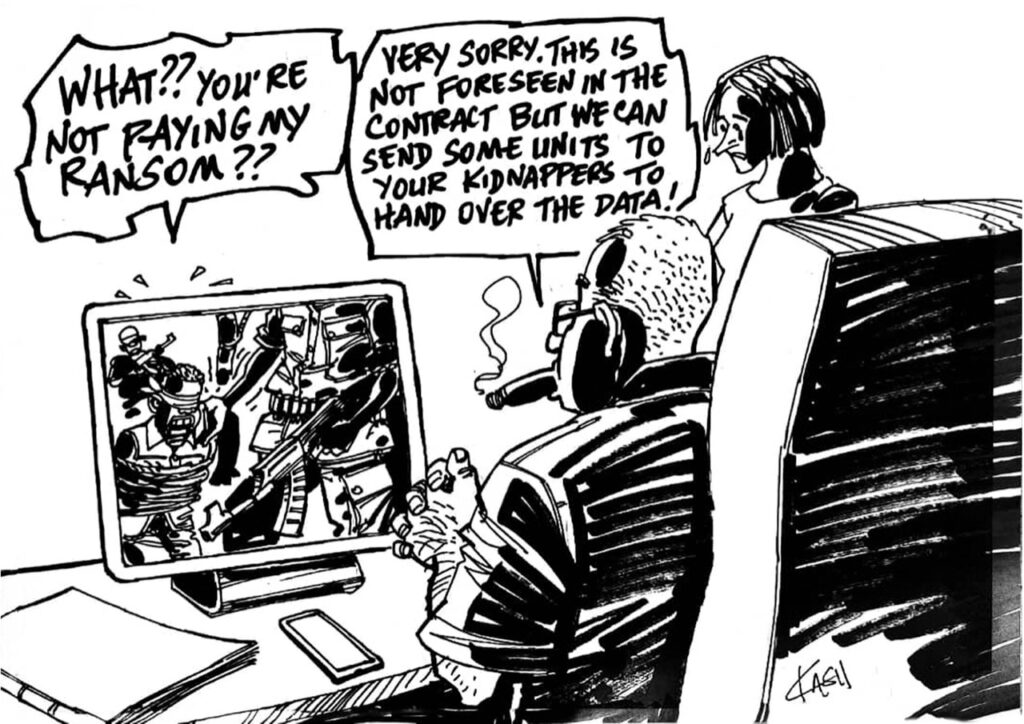There’s a lot of attention on this blog to localizing aid (increasing the power and resources in the hands of local organizations rather than white men in shorts), but what about localization of research?
For the next few weeks, I am largely handing over the blog to the Bukavu Series, a set of blog posts (and now a book) written by a group of 30 Congolese researchers plus a few European colleagues, with illustrations by Tembo Kash, a brilliant Congolese cartoonist, whose online exhibition illustrating the themes of the blogs is brilliant. Originally published in French, it is now available in English as a blog series, or a 140 page book. If this sounds familiar, it’s because we posted a few of them back in 2019 (eg see here and here). Don’t worry, the upcoming series is all new to this blog, and with added cartoons!
The posts are excellent, delving into a range of ethical and practical issues affecting local actors in the ‘research supply chain’ (because that is what it is. Although they are based in the DRC, their reflections have much wider relevance. I’ve sorted them into three broad thematic clusters:
- Positionality (the consequences for researchers of being ‘piggy in the middle’ btw communities and outsiders)
- Practice (the realities of doing research in conflict settings)
- Power (North-South asymmetries in the research business, but also male-female)
First up, the series intro (originally published here) from Koen Vlassenroot, Emery Mudinga, Godefroid Muzalia, Aymar Nyenyezi Bisoka and An Ansoms
Enjoy.
‘In early 2018, some thirty researchers based in both the Democratic Republic of the Congo and Europe gathered together in the eastern Congolese city of Bukavu to discuss the persistent side-lining of Southern researchers in contemporary cycles of knowledge production. Over the next two years, the group would reconvene repeatedly in Bukavu for a series of intensive workshops. Throughout these gatherings, participants sought to explore – and begin to address – the ethical issues that arise when Northern researchers engage colleagues from the Global South to carry out fieldwork in conflict and post-conflict settings.
The blog posts presented in the “Bukavu Series” critique existing logics behind the production of knowledge but also reflect on our own responsibilities. The different contributions call for a more inclusive debate and the recognition of a number of ethical challenges that research collaborators and assistants face. One of these challenges is related to the strategies they have to employ in order to navigate access to the field.

Although these contributors play a crucial role in forging access to difficult areas and source persons, collecting data, writing preliminary research reports, and eventually disseminating research results, their role has seldom been made visible in research outputs.
A second challenge is related to research collaborators’ and assistants’ interactions with populations in contexts of violence, conflict, or economic hardship. As some blog posts witness, research collaborators and assistants in the field often struggle with responding, or failing to respond, to populations’ financial expectations, and their questions concerning communication of research results to the local level. Besides the inherent ethical issues, this also complicates any potential return to these populations as part of future research activities.
A third and oft-neglected challenge that this series tackles is how to deal with the emotional dimensions of doing research. Research in conflict-affected environments can have profound effects on researchers’ mental well-being. However, doing research “at home” comes with a wide range of difficult challenges that are largely ignored by the wider research community and by those funding the research. Various posts focus on researchers’ entanglements and traumas, and shed light on strategies that might reduce the risk of traumatisation.
A fourth challenge is linked to the administrative and financial conditions of research projects. Some researchers criticize the fact that they are often “used” without a written or clear contract and without responsibilities being clearly defined if something happens to them in the field. Referring to the absence of an employment contract, some criticize the imprecision that characterizes their involvement in research. They often do not know what each person’s obligations and rights are in the process and the duration of their service. Some say they are paid according to the terms defined by the one who recruits without prior discussion or agreement.
Others say that they are asked to produce additional work long after they thought they had already finished their share of the work and without being paid for it. Other blog posts criticize the fact that researchers are sent to the field without being covered by any insurance in contrast to senior researchers, particularly from the North. Even more, the question of insurance for collaborators and research assistants is seldom addressed. This issue should be part of any debate aimed at improving conditions of collaborative research.’

An Ansoms is professor at the Université Catholique de Louvain, Emery Mudinga is professor at the Institut Supérieur de Développement rurale, Koen Vlassenroot is professor at Ghent University, Aymar Nyenyezi, is professor at Université Catholique de Louvain and the Institut Supérieur de Développement Rurale and Godefroid Muzalia heads the research centre GEC-SH.
That’s the overview, which may feel a bit abstract, but don’t worry – the upcoming individual posts really bring the issues to life in a way I haven’t seen before.